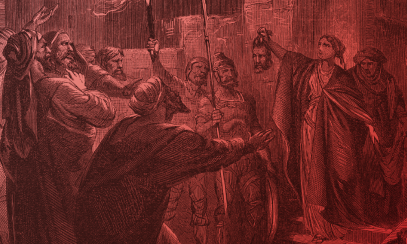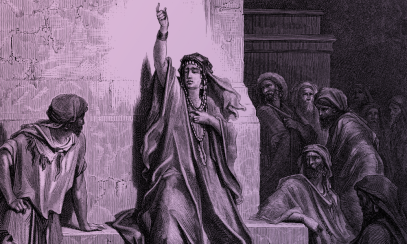
A Roadmap for Our Life in Christ the Beatitudes, Part II
In the Sermon on the Mount, Jesus gave us a roadmap for being his faithful followers. How do we best navigate this roadmap? Here are some guidelines:
Blessed are those who hunger and thirst for righteousness, for they shall be satisfied.
Hunger and thirst are powerful states. They indicate a need that demands to be satisfied. They are incessant, calling out for our attention continuously and in ever greater intensity through discomfort and pain. Ultimately, the price for failing to satisfy our hunger and thirst is death.
Our souls also need the spiritual food and drink of righteousness if we are to enjoy eternal life in communion with God. In Matthew’s Gospel, righteousness has to do with the saving activity of God. To fulfill all righteousness is to submit to the plan of God for the salvation of the human race. Our model for what this looks like is, of course, Jesus Christ.
If we are to be of the “same mind, with the same love, united in heart, thinking one thing” (Ph 2:2) as Christ, which is the point of the beatitudes, we, too, must empty ourselves of the false ego, that sense of self that glories in separateness from God.
It is only when we are “right” with God, i.e., that we seek to do only God’s will, that the desire for our greatest good, which is God’s will, emerges from our inmost being and overtakes us.
Blessed are the merciful, for they shall obtain mercy.
Mercy is only conceivable when a relationship exists in which one party has power over another. And, as Christians, we are called to be merciful in our own exercise of power – but what does this really mean?
Throughout our tradition, one of the attributes that has been assigned to God is that of omnipotence (all-powerful). We read in the Old Testament how the prophets often approached the Divine with fear and trembling in deference to this power. In fact, so great is the power of God that when Moses asked to see the Lord’s glory, God answered, “I will make all my beauty pass before you. ... But my face you cannot see, for no one sees me and still lives.” (Exodus 33:19-20)
An implication would be that in order for us to exist, God must withhold or protect us from the sheer power of his being – otherwise, we would be completely consumed. In this way, we are at the mercy of God, for God has all the power. That God exercises this power by constraining rather than asserting it may seem peculiar or contradictory to worldly thought. Yet, this is precisely the key to teaching the proper spirit and use of power for Christians.
In Christ, God chose to not only exercise his power by constraining it so that we might have life, but God then emptied himself and submitted to death so that we might have life more fully with God. This is the ultimate good. Thus, as Christians, we are to mirror this example in our own lives and in all of our relationships where we hold some measure of power whether physical, emotional, political, economic or social. However, this is only possible if we center our lives on God rather than on ourselves.
Blessed are the pure in heart, for they shall see God.
Several issues ago now, we learned, as St. Paul tells us in Romans 10, that faith comes from hearing the Word of God. Once we hear the Word of God, we then must believe the word. For it is by believing, as St. Augustine teaches, that we are made obedient to God; by being obedient (from the Latin “to listen to”) to God, we live a good life; by a good life, we obtain purity of heart; and with a pure heart, we understand the things we believe. And “[t]he promise [of seeing God] surpasses all beatitude ... In Scripture, to see is to possess ... Whoever sees God has obtained all the goods of which he can conceive.”
This means that this greatest good of seeing God is only possible if we are of the “same mind, with the same love, united in heart, thinking one thing” with God, i.e., we must be in communion. This communion is possible only through our keeping the commandments.
– Quotes from the Catechism (1691-1729, 2548) unless otherwise noted.
Doug Culp is the CAO and secretary for pastoral life for the Diocese of Lexington, Ky. He holds an MA in theology from Catholic Theological Union in Chicago.



